Mokwheel Basalt Review | A Roving Powerhouse
A fat-tire e-bike that provides plentiful power to its rider – and can deliver power to devices on the go!
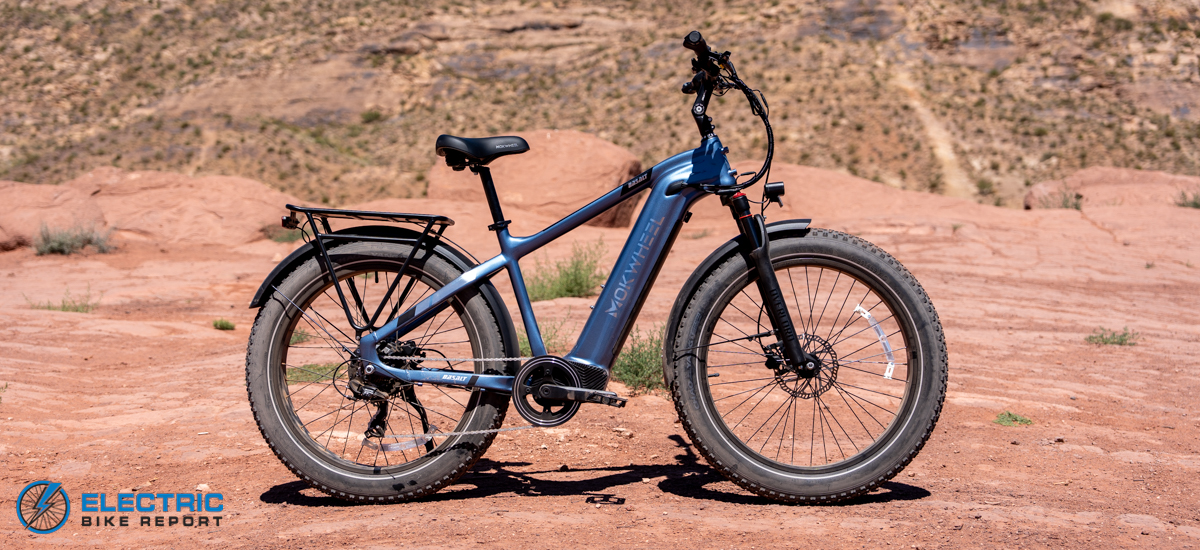
Mokwheel refers to the Basalt (as well as the Scoria, which we reviewed earlier this year) as a Power Station E-bike; it can power a host of devices when combined with an optional 1000W power inverter with USB-C, USB-A, and DC5521 outlets. Add in the optional solar panels and take your adventures to the next level; there’s no such thing as limited range or power when you have the sun!
Even without its accessories, the Basalt is still a solid e-bike. Its 750W motor has the power to keep pace with other heavyweights in the fat tire category, and delivers both electrifying speeds and the power to conquer nearly any incline. It’s a bike where the word “punch” quickly comes to mind from the first ride.
With all that brawn, you might expect it to feel like a rocket, but the Basalt’s motor engages smoothly and comfortably (though its intensity can be adjusted). A torque sensor sets the Basalt apart from many of its competitors as well; this provides power from the motor responsively and gives the bike a natural-feeling ride similar to a traditional bike.
Keep reading our Mokwheel Basalt review below to see how the bike performed in our testing!
 Pro’s
Pro’s- Tons of power! The bike’s 750W rear-hub motor delivers speed and uphill might with 90 Nm of torque.
- Smooth and responsive motor engagement! Thanks to a torque sensor, the motor gives more assistance as you pedal harder.
- Some of the coolest accessories – period! The bike can power your devices using an optional power inverter. Combine that with the optional solar panels and never worry about an empty battery again!
- Solid range even without the inverter thanks to a 941 Wh battery! Our test results differed from Mokwheel’s advertised range but still show a hugely practical amount of distance.
- Great brakes. Tektro E350 hydraulic disc brakes always perform well in our testing.
- Off-road capable with knobby fat tires, a front suspension fork, and wide handlebars for better control.
- A customizable fit thanks to the included adjustable stem. The bike comes in just one frame size, so this feature allows it to fit a wider range of riders!
- Great ride and braking stability thanks to the 26”x4” fat tires.
 Con’s
Con’s- A sticker on the Basalt claims it as a Class 2, but both its throttle and pedal-assisted speeds exceed those limits. The speed is fun, but we’d prefer to see the bike meet Class 2 and/or Class 3 requirements.
- The Basalt’s gearing leads to ghost pedaling around 24 mph. We’d like to see an 8-speed cassette with a wider gearing range to prevent this.
- Battery: Samsung 48V 19.6Ah
- Display: LED Integrated Color Display
- Motor: 48V 750W Brushless Rear Hub Motor
- Headlight: Included Dual LED Light
- Taillights: Included
- Peal Assist: 5-stage PAS
- Sensor: Torque
- Range: 60-80 miles (claimed)
- Throttle: Thumb Throttle
- Claimed weight: 79 lbs
- Rider Height: 5’-8” to 6’-4”
- Maximum payload capacity: 400 lbs
- Brakes: TEKTRO HD-E350 Hydraulic Disc Brakes
- Fenders: Included
- Fork: 110mm Adjustable Suspension
- Frame: 6061 Aluminum Alloy with Internal Battery
- Drivetrain: 7-Speed Shimano w/ 48T chainring and 14-28T Cassette
- Grips: Ergonomic Leather
- Saddle: Customized Comfort Leather Seat
- Handlebar: Aluminum Alloy 31.8mm, 720mm
- Kickstand: 6061 Aluminum Kickstand
- Tires: CHAOYANG 26×4.0″ Puncture Resistant Fat Tire
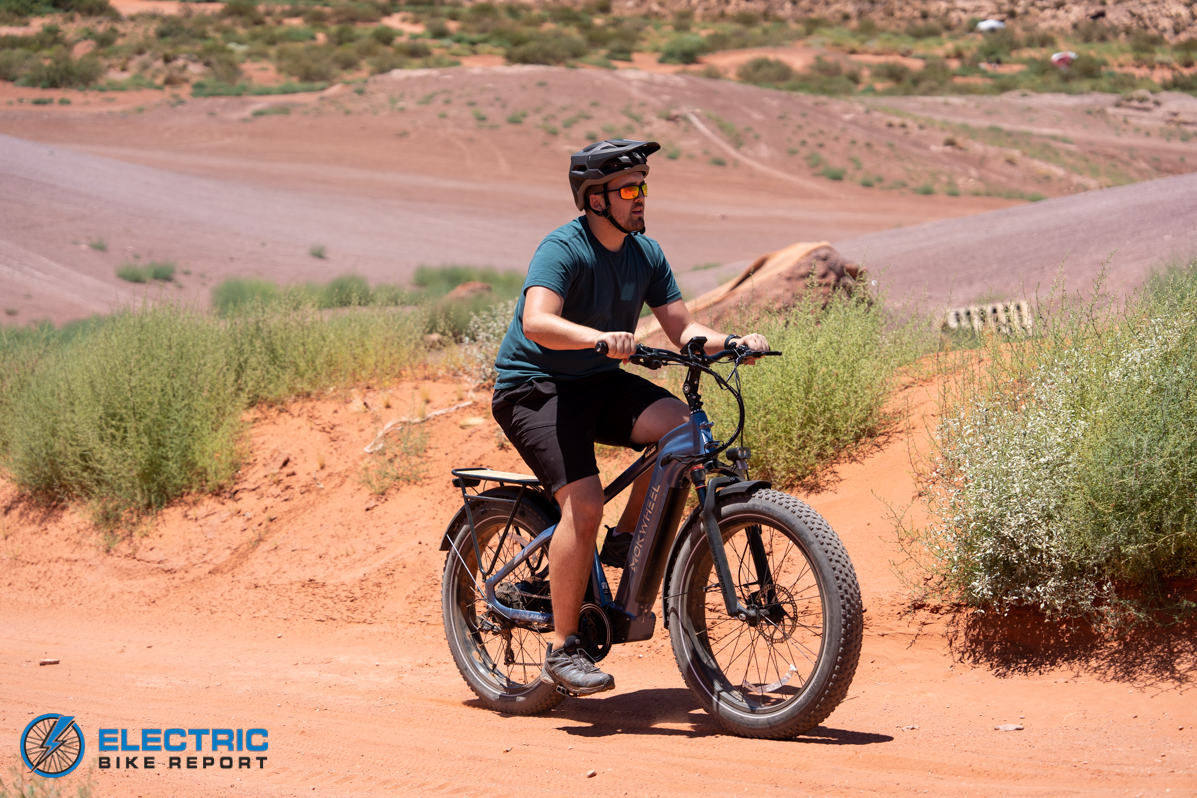
Common fat tire features and Mokwheel’s unique power station accessories make the bike well-suited to off-road adventures.

Mokwheel makes their own 750W rear hub motors and tests them to match the capabilities of other top brands.
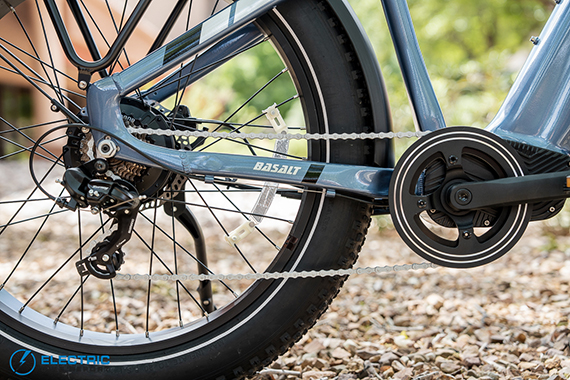
The Basalt’s Shimano 7-speed drivetrain shifted smoothly, but we’d prefer to see an 8-speed cassette with a wider gearing range.
Mokwheel Basalt Review: Speed Test

The graphic above shows the average speeds we measured on the Mokwheel Basalt in each of its pedal assist system (PAS) settings. Our data ranged from roughly 16.5 mph to 23 mph depending on the intensity of motor output in each setting, but this data needs context to be fully understood.
First, this is average speed data, not maximum speed data, so the bike is capable of going faster – and DID go faster – while we performed this test. In truth, the Basalt could travel at higher speeds than indicated both by its webpage and by a sticker on the bike itself. We measured speeds of up to roughly 31 mph through both throttle and pedal assist, though this required some effort to achieve. We found that the bike’s throttle speed could be adjusted through its settings menu, but there was no way to adjust the cutoff when pedaling.
It’s a blast to cruise at those speeds, but to ensure the bike’s legality, we’d prefer to see it ship as a Class 2 e-bike and/or Class 3 with the ability to be unlocked at the rider’s discretion. See our article on Throttle vs Pedal Assist to learn more about the three Classes of e-bikes and their limitations.
The next point of clarification is in regards to the data itself in comparison to the Step-Thru (or ST) version of the Basalt that we reviewed separately. The Basalt ST’s data indicates a relatively linear progression in power and speed between the bike’s settings, while the High-Step version I’m referring to in this review shows more of an exponential increase.
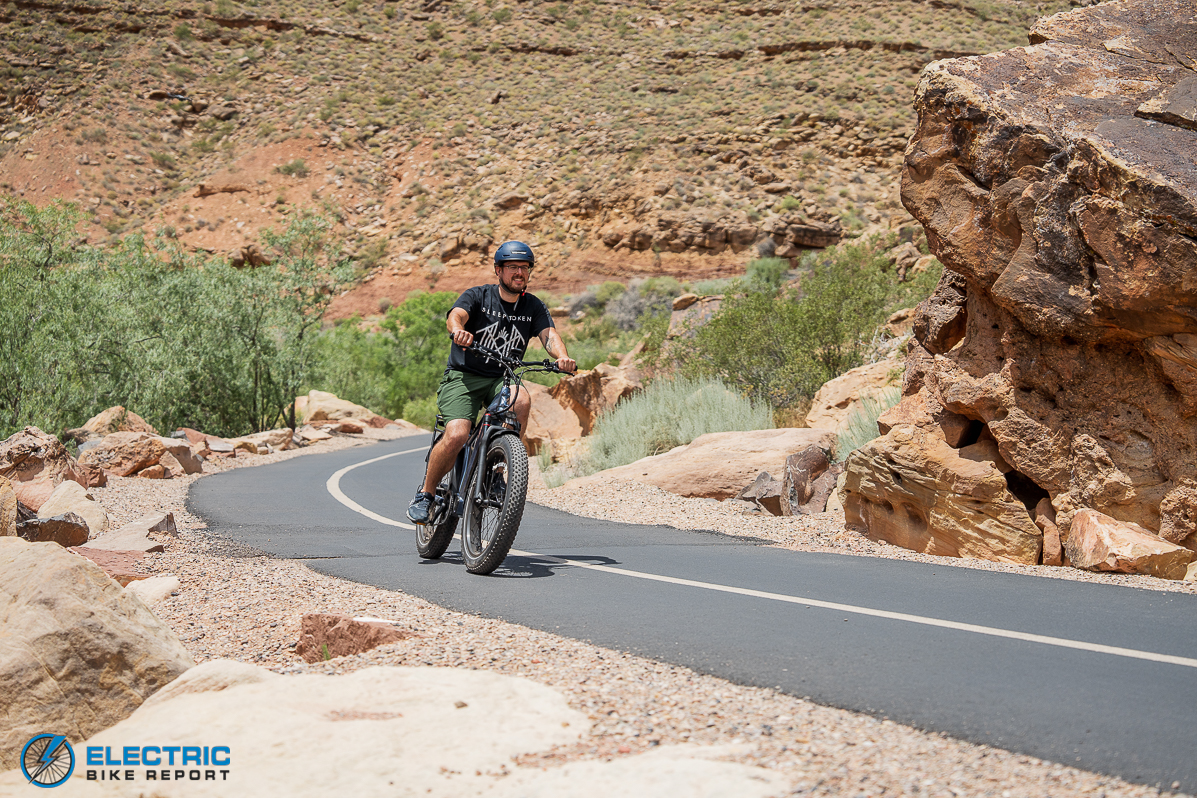
26”x4” fat tires give the Basalt a high degree of stability when braking and zooming around curves.
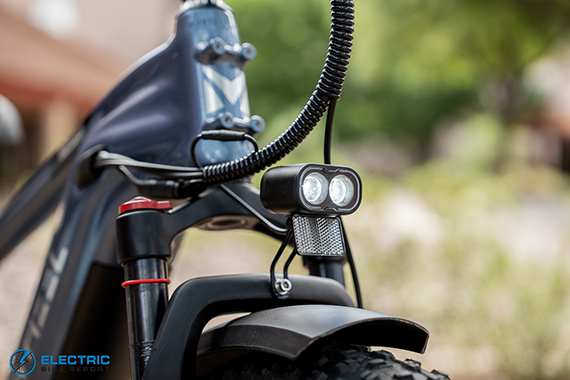
The bike’s massive 941 watt-hour battery is fully integrated into the down tube for a clean look.
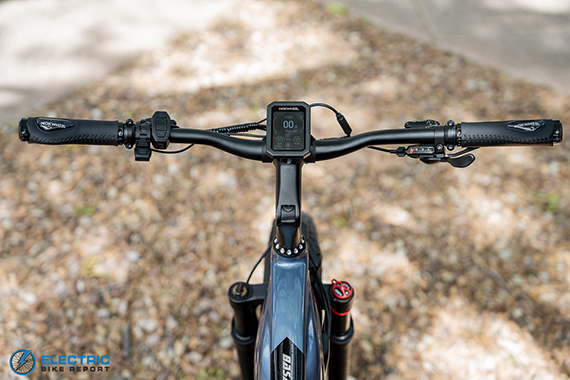
720 mm wide handlebars give the Basalt awesome off-road control!
We did notice one limiting factor on the Basalt that has been present on the other Mokwheel e-bikes we’ve tested. Currently, its drivetrain employs a 48T chainring and a 14-28T cassette. At speeds above roughly 23 mph, we encountered ghost-pedaling: a “loose” feeling that required us to increase our pedal cadence to an unnatural speed to keep up.
The bike’s 48T chainring is a good size, but the gearing range is narrower than we’ve seen on many of the similar e-bikes we’ve tested. We’d prefer to see an 8-speed cassette with a wider gearing range (perhaps 11- or 12-32T) to allow for better engagement at higher speeds.
Gearing aside, the Basalt’s capabilities and test results make sense for a bike with a 48V electrical system and a 750W motor. As explained in our guide to e-bike batteries, a 48V battery can supply more readily-available power to the motor than a 36V system. A 750W motor can use that available power to do more work than one of lower nominal wattage, including moving the bike faster and allowing it to climb hills more easily.
Mokwheel Basalt Review: Range Test

Mokwheel advertises a staggeringly huge range of between 60-80 miles with the Basalt – which would seem outrageous were it not for the bike’s absurdly high-capacity 48V, 941 watt-hour (Wh) battery!
We tested the bike’s range using both the maximum and minimum amount of motor assistance and measured a bracket of roughly 36 to 74 miles as shown in the infographic above. While the low end of our bracket is just over half of what Mokwheel advertises, it is still a tremendous amount of overall potential, and it is reasonable to assume that riders who vary their level of assistance will end up well within Mokwheel’s bracket.
Based on our testing, the Basalt’s motor and battery pairing seems to be efficient, though this is likely helped by its torque sensor. Using the method explained in our article on calculating the range of an e-bike, we estimated our travel time in PAS 5 to be roughly an hour and 15 minutes, but traveled for about an even two hours in that mode – all while conquering nearly 1000 feet of elevation gain. Since the bike’s torque sensor requires rider input, the Basalt is able to conserve some energy and extend its battery life.
In comparison to other similar e-bikes we tested previously, the Basalt is a champion! Its PAS 1 results didn’t quite beat the distance we measured on the previous version of the bike (again – torque sensor) but its performance is otherwise the best we’ve seen from a fat tire e-bike.
Mokwheel Basalt Review: Brake Test

The Mokwheel Basalt is equipped with Tektro E350 hydraulic disc brakes and 180 mm brake rotors, which we evaluated through the process described above. We measured an average stopping distance of 25’-4”, which is significantly longer than we expected.
Interestingly, the Basalt’s performance in this test measured far slower than the previous version of the bike (23’-3”) and even the new ST model we tested recently (23’-11”). For perspective, the average stopping distance across all of the fat tire e-bikes we’ve tested is, at time of writing, 21’-9”. This places the current version of the bike two feet beyond the older model and over three feet beyond the fat tire average.
These results were surprising, especially considering that we’ve enjoyed great performance from the Tektro E350 line of hydraulic disc brakes. Their performance does vary naturally based on the type, weight, tires, etc. of the e-bikes they are used on, but there is a reason we see this model regularly across e-bikes of all types and makes.
Ultimately, I believe the Basalt’s results in this test were affected by a failure on our part; we did not check to make sure that they were at their best. In my experience outside of this testing, they felt a bit “mushy” and in need of a bleed, though they still felt like good, effective – and most importantly, SAFE – brakes. The bike, however, felt remarkably stable and rock solid when braking overall. For the sake of fairness, I’ll refer to the Basalt ST’s results of 23’-11” which is certainly within our expected range.
Mokwheel Basalt Review: Hill Test
Our expectations were high for the Basalt in our Hill Test, which is explained in the graphic above. Fat tire e-bikes have a well-earned reputation for power due to their typical 750W motors and high torque ratings. With its 90 Nm of torque, the Basalt performed as expected in both its throttle-only and PAS 5 tests.
With just its throttle – relying solely on motor power – the Basalt gave one of the better performances we’ve measured, with a time of 1 minute and 14 seconds and an average of 14.7 mph. Its results in PAS 5 were more average, but consistent with other fat tire bikes with torque sensors, with a time of 1 minute and ten seconds at an average of 15.5 mph.
The Basalt proved capable both in this formal test and in my own separate evaluation. As expected, the bike has the power and torque to conquer the toughest of hills, which means that its ride is even more comfortable on average slopes that riders are likely to encounter more often in the wild.
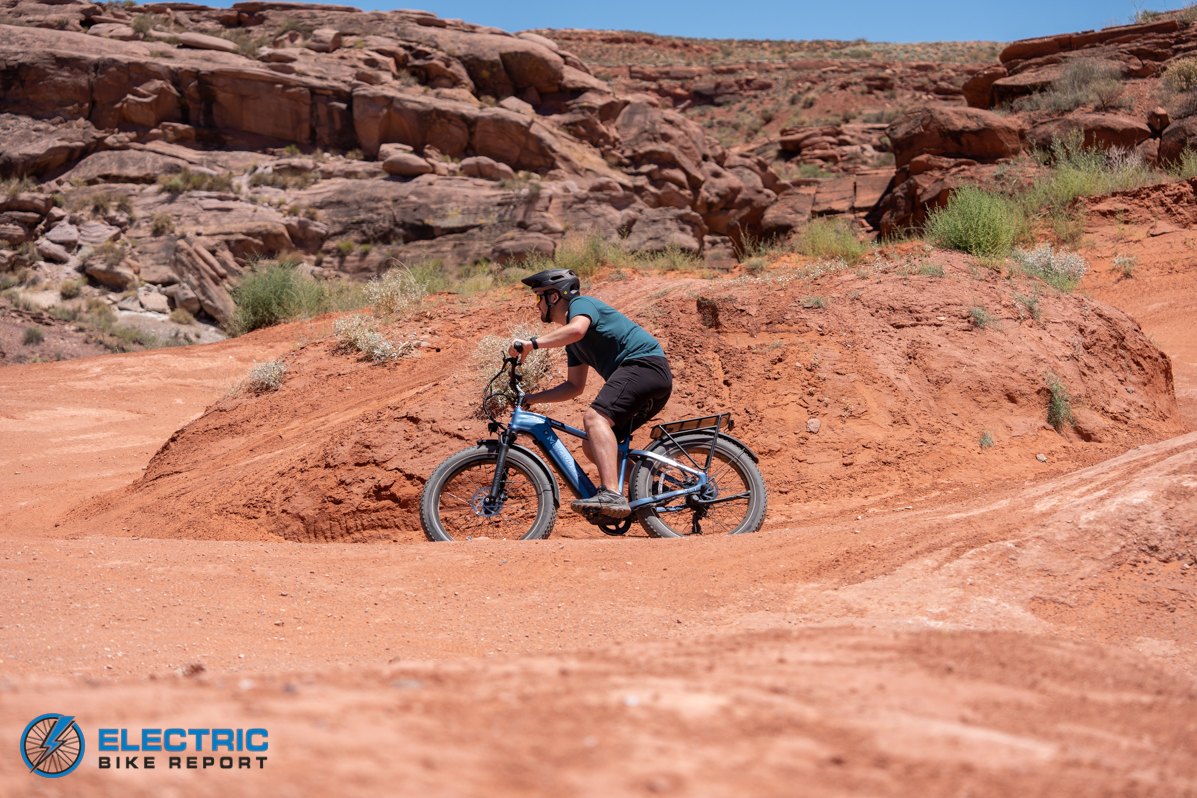
The Basalt packs plenty of power for rougher environments!
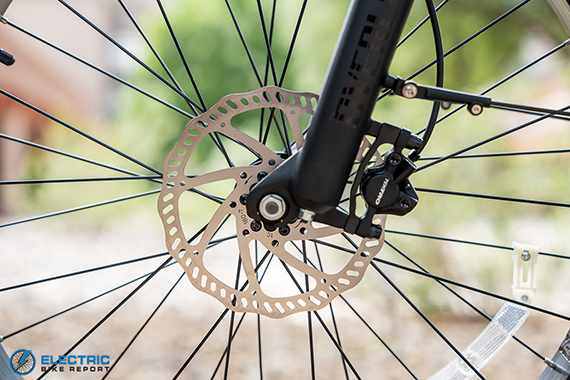
Tektro E350 hydraulic disc brakes are always a welcome sight!
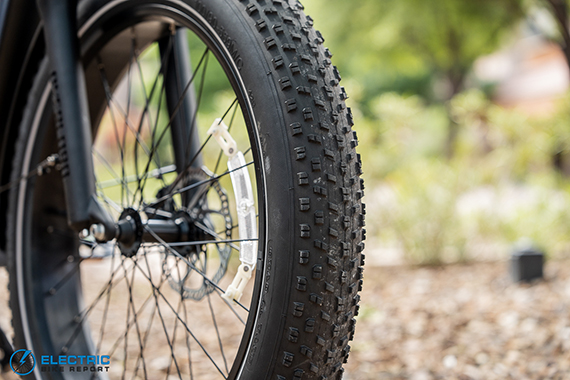
Knobby 26”x4” fat tires handle various types of terrain well and help to slow the bike quickly.
Mokwheel Basalt Review: Ride Quality
Aside from a few small (and easily changed) elements, I found the Basalt’s ride quality to be excellent! This is, once again, a typical and defining feature of fat tire e-bikes; they tend to be well-suited to longer rides due to their comfortable riding position and contact points.
The Basalt features a wide, thickly padded saddle that can be easily adjusted in height through the use of its quick-release clamp, or adjusted in angle with an allen wrench. The bike comes in a single frame size to accommodate riders between 5’-8” and 6’-4”, but its adjustable stem allows the handlebar height and reach to be tailored to the rider. It also allows for a change in positioning; for me, the bike’s initial setup included more of a forward lean than I wanted, but the stem allowed me to make it much more upright and comfortable.
It’s important to note that the bike does not have a rear suspension, so for off-road use, it can feel somewhat stiff. The front suspension fork has a respectable 110 mm of travel that soaks up bumps, but if I were to own the bike, I’d surely consider a suspension seatpost – or at the very least, a vibration-absorbing gel saddle – before going on any long adventures in the wild.
The bike’s handlebars do lend it to navigating rougher terrain, however; 720 mm is wider than we typically see on fat tire e-bikes, and they offer excellent control! I personally wasn’t the biggest fan of the ergonomic grips, though these would be an easy thing to replace.
In terms of handling, the bike is large but maneuvers well even at higher speeds. As expected, the 26”x4” Chaoyang puncture-resistance tires performed well on pavement and dirt, and their girth made the ride much more comfortable. Fat tires naturally provide stability that I personally find myself missing on bikes with narrower tread.
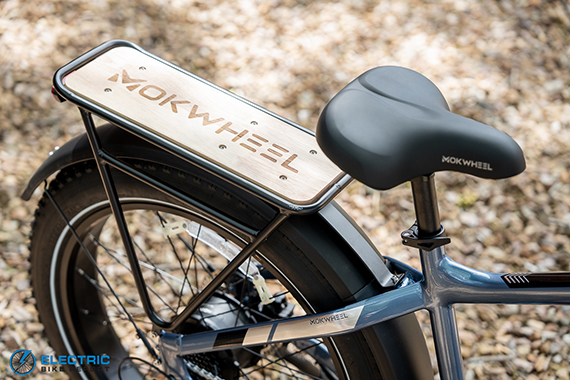
In addition to a wide, comfy saddle, the Basalt includes a cargo rack with a wooden deck.
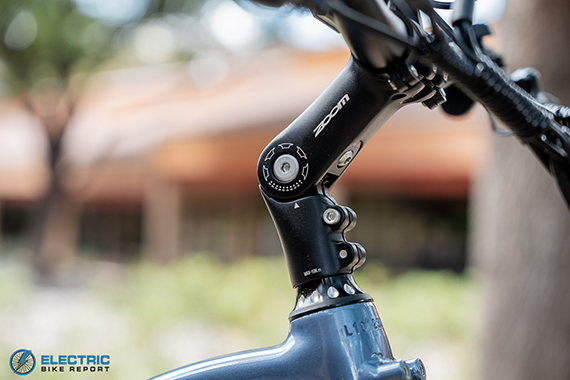
An adjustable stem helps the bike’s single frame size to accommodate a wider range of riders.
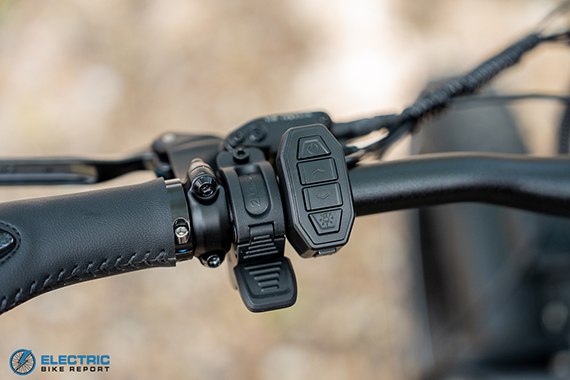
The bike’s thumb-operated throttle lever and control panel are mounted on its left handlebar.
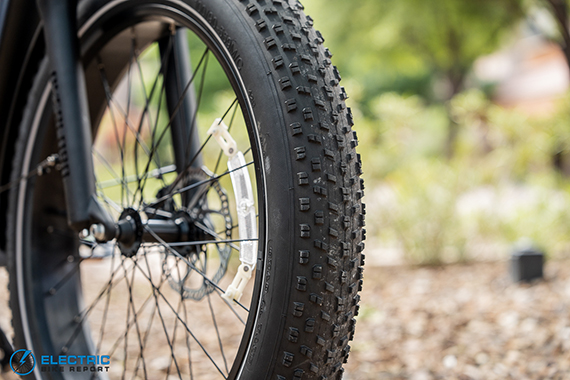
Mokwheel’s unique color display is a nice change of pace from many of the standard black-and-white displays we often see.
Mokwheel Basalt Review: Summary / Where to Buy
On its own, the Basalt is a good fat bike, but it’s the unique and functional accessories Mokwheel offers that push it into exceptional territory. There’s a reason this bike has been on our list of the Best Fat Tire e-bikes since we reviewed the first model; when combined with its optional power inverter and solar panels, riders no longer need a home base to return to! Adventuring potential is only limited by the quantity of supplies the bike can hold (but there are accessories to expand that as well).
In terms of performance, the Basalt’s range and motor power were some of its most impressive elements. We’d like to see it follow the legal limitations of Class 2 and/or 3 e-bikes in terms of maximum velocity, but if I’m being honest, we did enjoy tearing around at top speed. Improvements to the bike’s gearing – namely, a cassette with a wider range of cogs – would help riders to reach the Class 3 limit of 28 mph, however, as it is currently challenging to pedal above 24 mph with the current setup.
As it stands, the Basalt remains a fantastic option for campers, weekend adventurers, and urban explorers alike; it can handle most environments confidently and does it all in style and comfort.
‘Happy Riding! Make sure to let us know if you have any questions down in our comments section or if you think we left anything out in this review of the Mokwheel Basalt.



I’m looking for a fat tire e-bike n have found your reviews to be the best n most informative. My only suggestion; for example I have a 100+ lb dog n would like to know how the e-bike performs with weight, both going up hills n stopping coming down them. Also how mileage is reduced under a load. Due to your excellent review of the Mok Basalt I have decided on the bast e-bike for me, thank you.
Ive customized a childs tow-behind trailer to carry my dog (65lbs) cooler and surfboard to the beach every weekend. Im 10mi from ocean with hills in between. My speed avg dips with the load but no great loss on hills. A bit more peddling and exercise on the hills. But if youre a patient person, throttle only wil get you up most any hill with your dog in tow. Im 170lbs and with my dog, cooler, surfboard, im still far below the 400lb limit.
I have a Basalt and tow a 26lb customized kid carriage with my cooler 10lb +-, surfboard 24lb, and a 65lb Aussie. Im 180lbs and the beach is 12mi away and the path has moderate long hills back and forth, 50% flats. In PAS 3 and mild to moderate peddling I have NO ISSUES.
The bike is heavy, a beast, but GREAT. Heavier gives it better traction as well. Ive tried at speed to get it to “wash out” the front and get it to slide, but it wont. I was on grass and weeds.
Hey Chris, thanks for sharing! Sounds like you’re having a blast!
Does the Mokwheel Basalt ST have a torque or cadence sensor?
Hi John, both updated versions of the Basalt (including the ST) now use torque sensors!
Hello.
I’m 6’4″ tall and 280lbs – would this bike work for me?
Looks like quite the impressive bike.
Thank you
Hi Dave, thanks for reaching out! You’re right on the top end of the height range, but the adjustable stem should allow you to get a good fit. The bike is definitely large and powerful enough to accommodate you. It’s a super fun and really unique bike with all the accessories. Happy shopping!
Does the Basalt ST also have 90Nm?
Yes it does!
So far 500 miles of no issues I ride in sw FLA, easy 30 mph no hills in fla, sand mud no problem I am 5’9 190 added the seat spring a must for long rides, the bike is plenty fast with pedal assist and full throttle no one has passed me yet on the sand and mud trails it’s no little bike but if you want that shop in arizona and pedal after 50 miles…
As I haven’t ridden a fat tire bike yet I have been told these bikes such as the Mokwheel Basalt are almost impossible to ride if the power goes out ( no battery power). Can anyone comment on this …
They’re not super fun to pedal without the motor, so it’s a good idea to keep an eye on your battery and be close to home if it goes out. I’d say it’s totally doable to pedal on flat ground, but on hills, you’re likely going to want to walk.
How well would the Basalt handle snow and ice? I thinking of getting it to use for ice fishing.
We don’t have the opportunity to test bikes in snow and ice here in southern Utah, but I do know that tons of folks have great luck in winter conditions on fat tire bikes. That’s one reason they were invented! This is a good article on the history of fat tire bikes.
Both of our Basalt bikes are okay except the plastic brackets that hold the screen and control modules on the handlebars are weak and fail soon. Mokwheel will not address these failures.
0 stars! DO NOT ORDER FROM THIS COMPANY. Cool YouTube unboxing videos but don’t be fooled. It is now well over the time my bike was supposed to ship and I have already been charged but can’t get through to customer service. Usually with a legit purchase, the transaction is pending until shipment. Not in this case. I was charged immediately. I have been calling daily and staying on hold for hours with no answer. I have left voicemails and also emailed. Nothing. I am now seeing other reviews stating that they have major problems with the bike (manufacture problems and shipping damage) but cannot get through to them. I believe this because I cannot get through. This is the worst purchase I’ve ever made. I would rather spend double the price I spent than deal with a crappy company that can’t even answer their phone or stand by the promises on their website. The positive reviews are fake.
Jessica, I’m so sorry to hear about your negative experience. I’ll pass your information along to our contact at Mokwheel; hopefully they can get things sorted out for you. Please let us know what happens!
My Basalt ST and accessories arrived within 7 days via FedEx this week. The only issue I had was FedEx’s estimates being off (I stayed home to sign for the bike). I’m sorry to hear about Jessica’s experience, mine was great.
My wife and I bought 2 basalts in November. Bikes arrived quickly, the buildout was quite easy. We’ve really enjoyed them.
But then…….. while transporting them we had a failure with the Mokwheel double bike rack. Not a big deal but unusable until I get parts. I have called Molwheel 4 times. Never spoke to a person, although waited for a ridiculous amount of time. Left a message each time. I have NEVER received a call back. It’s been over 6 weeks of leaving messages. MOKWHEELS CUSTOMER SERVICE IS TERRIBLE!!!!!!! Good luck if you ever have a problem!
I ordered two Asphalts on May 30th. One bike arrived with a defective fork. The steerer tube was bent which caused the front tire to be misaligned. I have reported the defective part to Mokwheel’s customer service. I supplied pictures to Chad and was told a new fork would be sent out. Well, it is now July 13th and I am still waiting on my replacement fork. My phone calls and emails to customer service the past three weeks have been ignored. My second bike arrived one month late. Based on my buying experience, Mokwheel is not a company that honors its alleged two year warranty. They are not a company to be trusted. I have also posted a critical review on their website that was never posted. No wonder they have nearly 65 5 star reviews. They obviously do not post their negative reviews. Their customer service has been terrible and I would warn everyone to think twice if considering a Mokwheel bike.
Hi Lance, thanks for sharing your experience. Sorry to hear it was less than positive! I forwarded your comment to our contact at Mokwheel in the hope that they can be of assistance. Let us know how it works out!
John,
Perhaps it was due to your intervention, but soon after I posted my less than positive review of Mokwheel, I received a message from Chad at customer service, that my fork was preparing to ship. My wife’s bike finally arrived last week. I received my new fork yesterday and plan to swap it out in the next few days. I greatly appreciate your help and willingness to facilitate a solution to my problems. It is a shame that Mokwheel is risking a very nice bike on slow customer service.
Thanks again,
Lance
I’m happy to hear that, Lance! Thanks for letting us know how your situation turned out. We appreciate the update.